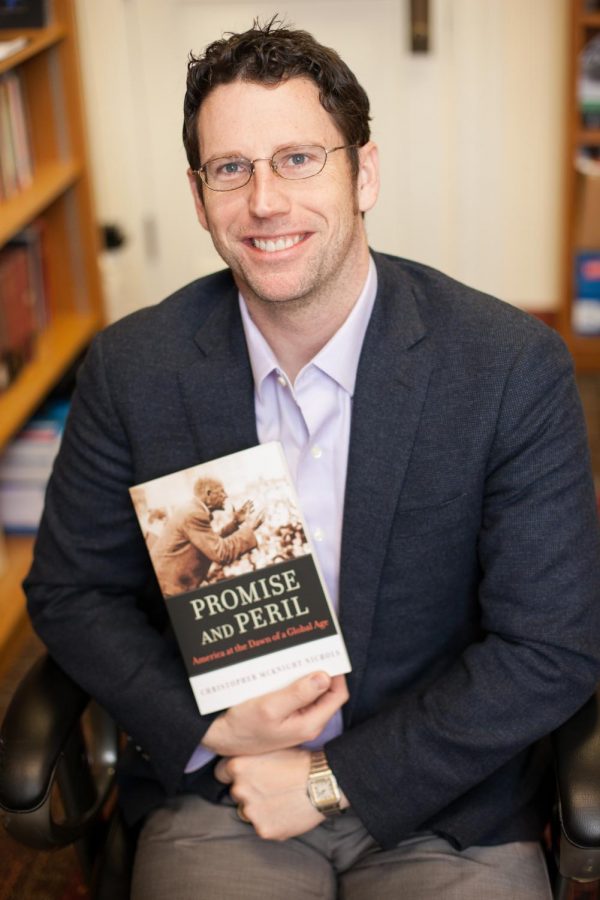OSU professor awarded Andrew Carnegie Fellowship
April 28, 2016
Christopher Nichols, an assistant professor of history at OSU was awarded one of the 33 prestigious Andrew Carnegie Fellowship awards last Tuesday for his work with the social sciences and humanities.
The Andrew Carnegie Fellows program is awarded to more than 30 scholars supports research by providing up to $200,000 to recipients in order to support furthered innovation on topics with regard to challenges to democracy and international order.
The program selects a collection of scholars, journalists, public intellectuals and leaders in order to gain broader knowledge in the areas of law, technology, business, and public policy. The recipients were chosen based off of nominations universities and other foundations.
Nichols has taught at history OSU for four years, primarily with a focus on the U.S. role in the world and American isolationism and internationalism. He has authored several academic journals and papers as well as published books such as Promise and Peril: America at the Dawn of a Global Age.
Nichols pledged to write a book that will cover American international foreign policy from founding of the United States to today. He also plans to incorporate summer institutes regarding internationalism and foreign policy at OSU.
Nichols spoke about the impact of winning this award.
“It hasn’t settled in quite yet,” Nichols said. “I do not know the real impact yet, but I do know that these awards are very rare in the liberal arts field, specifically with regard to the humanities and history. I have pledged to accomplish a lot with the fellowship that I think will have an impact here.”
Nichols spoke to the methodology behind why his research is important and how history can aid in contemporary times.
“I like to use the humanities to address important contemporary challenges,” Nichols said. “We are much more comfortable sticking with the past however intellectual discussions can be used to draw out the connections between the past and present. There are clear connections that a lot of the stuff I have written about from a historical standpoint still impacts us today. It is these ideas that drive my passion.”
Nichols also commented on how the humanities can inform and help address urgent, important problems.
“A cautious answer is that history can only help,” Nichols said. “It does not always solve our problems, but it informs us in the present and gives us the tools to solve contemporary issues. There is no perfect parallel between the past and present, but it can give ideas on how to address problems.”
Nichols has also served as the Director of the Citizenship and Crisis Initiative, which looks to address issues regarding the relationship between citizenship and crisis. The initiative has puts on events throughout the year that look at contemporary social issues.
Samantha Trunkett, a senior in political science, worked with Nichols on the Citizenship and Crisis Initiative and spoke to his passion behind his work.
“We have been working on various events and panels throughout the year,” Trunkett said. “Dr. Nichols has been so supportive, a great mentor and a wonderful person to work for.”
Trunkett also spoke to the work that Nichols has done.
“Dr Nichols puts his all into everything that he does,” Trunkett said. “It does not ho unnoticed by his colleagues, students and others outside of the university. This is an amazing award and I am very excited for him.”
Ben Mutschler, the director of the school of History, Philosophy and Religion, spoke to Nichol’s character and work ethic as a colleague.
“Dr. Nichols is a committed teacher and quite important scholar,” Mutschler said. “He is a wonderful, consciences, generous colleague to work with.”
Mutschler spoke to Nichol’s talent of working with a broad range of individuals and his ability to spark interest in history.
“He combines deep academic learning with real engagement with a broad public,” Mutschler said. “He is a public intellectual that has support for a really important new book and he is also bringing a whole range of thinkers to OSU. He does a lot of outreach including visiting lectures and panels. I think he helps bring public attention to focus on the discipline of history.”
Nichols was also recently appointed to the Oregon Historical Society (Portland) Board of Trustees as the first historian from OSU. This appointment will include working with the Board to aid with the education and outreach of the humanities specifically with regard to youth according to Nichols.
In addition to this Nichols also is the vice president of the new honors society Phi Beta Kappa that is being inducted to OSU for the first time. Phi Beta Kappa is the oldest and most prestigious honor society that celebrates excellence in the liberal arts and sciences. Only 10 percent of arts and science students will be invited to join each year. The society includes 17 US presidents and 39 supreme court justices.
Nichols, a member himself, spoke to the prestige of the chapter.
“This is a great opportunity for students,” Nichols said. “This can go on a resume right next to your degree and employers know that it is an obvious mark of honors.”
Mutschler commented on the overall potential of Nichols with regard to him receiving this fellowship.
“Dr. Nichols is a combination of a very serious scholar who has a gift for engaging the public,” Mutschler said. “This makes a very good combination and I look forward to seeing what he will do with this award.”











































































































